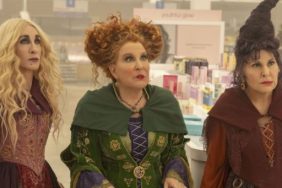
CraveOnline: This film has a lot of scenes of ineffectual therapy, and that concludes in an interesting way. What do you think the film’s take is on therapy? Do you think it’s saying that therapy is a bit of a sham or is it just in this situation?
Marjane Satrapi: No, I think therapy… it depends on the kind of therapy it is. Jerry has to go to a state doctor who just has to fill out paper. She doesn’t have the time to spend with him, she doesn’t have the time to talk to him. That’s what you have the end where she talks to him and [SPOILER] he doesn’t kill her. [END SPOILER.]
Because she’s the only one who talks to him, and she says, “Jerry, being lonely in the world is the root of all suffering, but you are not alone.” And we’re like, “You fucking liar. This is exactly the problem, that he’s alone.” It’s more about the loneliness of the guy.
I have to say, this is obviously not a film about schizophrenia, because if I wanted to make a film about schizophrenia then I would make [that] film. That [would mean] I am really responsible. It’s about somebody who’s a psycho, let’s say. You know?
I made lots of reassertions. People, they don’t take medicine because this medicine has lots of side effects. On top of that they’re all alone, so who will push them to take them? Nobody. This guy is all alone, by himself, so he tries to do his best and he doesn’t succeed. Is he a monster? No, he’s just sick. So it’s more about the loneliness. I think therapy can be really good but we have to treat sick people like sick people, we cannot just call them monsters.
“You know how some of these cats have this ‘fuck you’ look?”
You say he’s all alone but he does have a cat and a dog. I was wondering if you could tell me, because I imagine this must be an interesting process, about casting those animals.
The casting is really like the casting of human beings. I could be there thinking more about a labrador, a cuter dog that everybody loves, but then they present me this dog and he’s so fucking excited. He looks so nice and friendly, and I say, “Okay, we’ll take this dog.” You tell him sit and he sits, run and he runs, and if you turn around he does it.
But then you have this cat that is so mouthy, that will say so much bad stuff. So if this cat has a special physique he will take over everyone. He’ll be too interesting. So then I think, okay, if we have this cat that has such a character then he should be a little tabby orange cat. The most normal cat, because he talks so much he’s already sticking out, and if he looks too special it’s going to be too much. So then you look for that, and this cat for example, he really has this look. You know how some of these cats have this “fuck you” look? They look at you and they’re all the time making fun of you, just by looking at you? So he has this look and I fell in love with him.
Last question: you said that you’re motivated by fear, by thoughts of what you can’t do, and then you try to confront that in your films…
Yes…
What scares you now? What are you interested in tackling in the future?
I would love to do lots of things. I would love to do a superhero story with an alcoholic, big smoker superhero. Because in real life if you are a superhero, you are like Dean Martin. You are beautiful, you are tall, you can sing well, you can act well. You wiggle your finger and fifty women fall down. But then you become an alcoholic. Because you have all the power, of course you become depressed.
I would also love to make a musical. I would love to make a war movie. But now I’m working on two projects, and I’m very superstitious. I’m not going to tell you which ones because then they won’t happen.
Fair enough.
I promise that when I do it, you will know!
William Bibbiani is the editor of CraveOnline’s Film Channel and the host of The B-Movies Podcast and The Blue Movies Podcast. Follow him on Twitter at @WilliamBibbiani.






